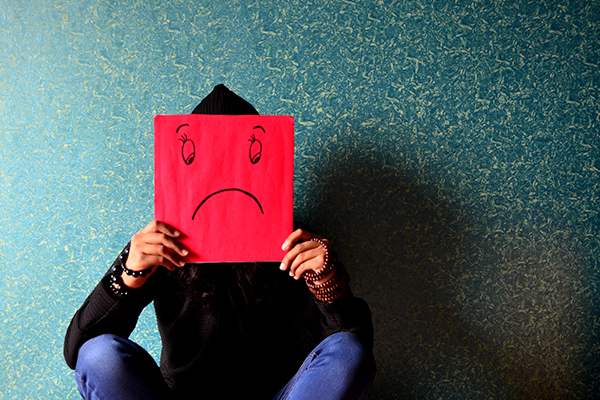Do you or someone you know experience a loss of interest in work, family or once pleasurable activities or hobbies? Are you tired and irritable or feeling angry and aggressive, sad or worthless often? Do you have trouble sleeping or oversleep? Do you feel tired, sad, anxious, hopeless or “empty”? Have you been feeling like this for weeks or months? If so, you or someone you know may have depression. The following post contains an overview of signs of depression in men and women. It is intended for informational purposes only and should not be considered as a guide for making medical decisions without discussing it with your doctor.
What are some signs of depression in men and women?
Even though more than 5 million men in the U.S. experience depression each year, men tend not to seek help for depression, largely due to the stigma that surrounds the subject1.
It’s normal to feel sad or irritable or have trouble sleeping occasionally. These feelings most likely pass after a couple of days and don’t interfere with daily living. However, when someone has depression, he or she has trouble and interference with daily living and loss of interest in anything for weeks at a time.
Everyone is susceptible to depression, from children all the way to elderly. Both men and women get depression but signs of depression in men, although they could be similar to those in women, can be experienced differently than women. According to the National Institute of Mental Health, men may be more likely to feel irritable and lose interest in their daily lives such as hobbies, work, and family. Some other signs of depression in men that could be different would be that they have more difficulty sleeping than women who have depression2. Women tend to experience depression more commonly than men likely due to biological, hormonal and social factors unique to women, such as postpartum depression, perimenopausal depression or premenstrual dysphoric disorder3. This hormone-related depression could cause women to have more drastic changes than men in mood and emotions and may not be “just a mood swing.”
According to Dr. Cook, a professor of psychiatry at the University of California, Los Angeles, symptoms to diagnose depression are the same regardless of men or women but the chief complaint can be different among men and women. For example, some signs of depression in men that could be chief complaints would be fatigue, stomachache, backache, irritability, stress, anxiety, substance abuse, and sexual dsyfunction3. Often times what happens is men tend to come in with a chief complaint of one of these symptoms and often times the root of the problem to a group of symptoms could be depression and not necessarily digestive upset or stress.
How can acupuncture help with depression? What about anxiety?
Acupuncture has been found to be highly effective for depression, mainly mild to moderate depression. One new study has found that acupuncture and Traditional Chinese Medicine has been as effective as antidepressants, while other studies have found that it can help with medication side effects or have a synergistic boost in the effectiveness of the treatment of depression, especially for severe depression where medication is prescribed4,5. A study published in the Journal of Alternative and Complementary Medicine found that electroacupuncture, which is acupuncture with a mild painless electric current transmitted through the needles, was just as effective as Prozac4. Most also experience anxiety with depression and according to the Anxiety and Depression Association of America, managing severe anxiety can be tricky and not provide results for several months due to the fact that most treatment includes therapy and drugs with undesirable side effects6. Dr. Marcellin supported a paper that stated that acupuncture is a way to manage anxiety that works faster than therapy and keeps drugs out of the picture. This is due to the fact that acupuncture affects the part of the brain that regulates emotions, which means that it naturally reduces anxiety faster and more effectively than drugs6. In other words, acupuncture helps you to take back control of your own body, which brings a better quality of life.
I’m ready to take back my life. What are my next steps?
Do you or someone you know compromise your quality of life due to depression or anxiety? Imagine a life without depression or anxiety. Call or email Pure Health Alliance today to schedule your next treatment. We would love to help you take back control of your life and live the thriving life you wish to live.
1. 7 Surprising Signs Of Depression That Prove It's Not All About Sadness. Men's Health.
https://www.menshealth.com/health/symptoms-of- depression-in- men/slide/1. Published
May 19, 2017. Accessed January 30, 2018.
2. Men and Depression. National Institute of Mental Health. https://www.nimh.nih.gov/health/publications/men and- depression/index.shtml. Accessed January 30, 2018
3. Depression in Women: 5 Things You Should Know. National Institute of Mental Health. https://www.nimh.nih.gov/health/publications/depression-in- women/index.shtml. Accessed January 30, 2018.
4.12 Signs of Depression in Men. Health.com. http://www.health.com/health/gallery/0,,20521449,00.html#what-depression- looks-like-1. Accessed January 30, 2018.
5. Stern TRV. Can Acupuncture Treat Depression? Scientific American. https://www.scientificamerican.com/article/can-acupuncture- treat-depression/. Published July 1, 2014. Accessed January 30, 2018.
6. Li J. Acupuncture Alleviates Depression and Anxiety, Boosts Paxil. HealthCMi CEUs.http://www.healthcmi.com/Acupuncture-Continuing- Education-News/1678- acupuncture-alleviates-depression-and-anxiety. Published September 11, 2016. Accessed January 30, 2018.
7. Hohman M. Why Acupuncture Works for Anxiety Relief. EverydayHealth.com. https://www.everydayhealth.com/news/why-acupuncture- works-anxiety- relief/. Published August 21, 2014. Accessed January 30, 2018.

